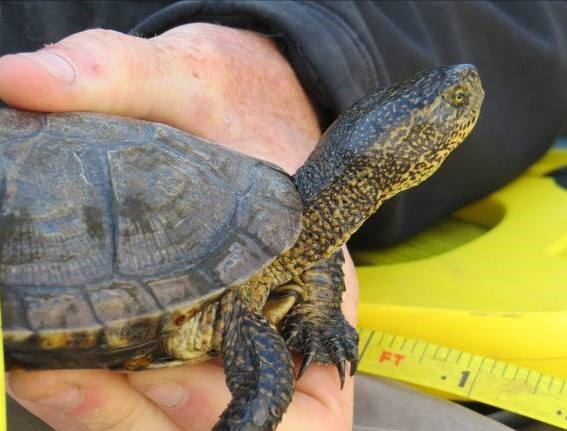Pond Turtle Species Proposed for Listing Under the Federal Endangered Species Act
Listing Overview
In Fall 2023, the United States Fish and Wildlife Service (USFWS) proposed to list the northwestern pond turtle (Actinemys marmorata) and southwestern pond turtle (Actinemys pallida) as threatened under the Federal Endangered Species Act (ESA) in the Federal Register (https://www.regulations.gov/document/FWS-R8-ES-2023-0092-0001). The USFWS has not determined a designation of critical habitat yet. The range of the two species are shown in the figure below.

Both listings are proposed to have special conditions applied under the 4(d) rule which allows for some take of threatened species to occur when it results from certain activities, such take would not interfere with the recovery of the species and would benefit the species. The proposed 4(d) rule for the two threatened pond turtles would allow exemptions for some activities such as wildfire management, restoration actions, and non-native species removal.
As a species proposed for listing, protections may apply in specific situations, but full protection under the ESA will not be provided until the final listing rule becomes effective. A final rule is anticipated to be released late in 2024. Regardless of current protection, WRA recommends effects to pond turtles be included and analyzed during Section 7 consultations with USFWS unless the subject project will be completed before the listing is finalized. This topic is important to project proponents because once listed and ESA protections are conferred, any “take” without a federal-issued permit will not be allowable
Currently, the California Fish and Game Commission (CFGC) has not listed the species under the California Endangered Species Act (CESA), though both species are designated as special concern in California. This designation triggers consideration of the species under the California Environmental Quality Act (CEQA) and allows the California Department of Fish and Wildlife (CDFW) to write measures to protect individual pond turtles into permits that they issue (e.g., Lake and Streambed Alteration Agreements).
Species in Decline
While it is still relatively common to find pond turtles in suitable habitats in central California, a hidden decline in the species has often been suspected. This is because turtles tend to have long lifespans (estimated at up to 70 years) and adult turtles have few threats in most natural environments and are easily observed. However, young turtles are very vulnerable to a myriad of predators, especially non-native species such as bullfrogs, which have become prevalent throughout much of the state. This has resulted in low numbers of turtles being replaced in the population. For this reason, pond turtles may be much more imperiled than they would appear. USFWS models indicate that under current trends both species of pond turtle are likely to meet the criteria for endangered status in the foreseeable future if action is not taken. Given this, it is expected that listing of both species will be finalized before the end of 2024. Critical habitat for pond turtles will be addressed at a future date.
WRA Experience
WRA supported Ducks Unlimited, Inc. and the California Department of Water Resources (DWR) with habitat restoration on Sherman Island. WRA wrote the western pond turtle Trapping and Relocation Plan and submitted the plan to CDFW for approval. WRA led the trapping and relocation and coordinated and led the approved monitors during construction. A total of 222 individual turtles were successfully relocated during trapping and construction salvage efforts.
How WRA Can Help
WRA has decades of experience working with regulatory agencies and project proponents that must consider the impact of projects on species listed under the federal and state endangered species acts. Contact WRA’s regulatory specialists if you have questions on the implications of the proposed listing.
WRA Contact:

Brian, Freiermuth, Senior Biologist
freiermuth@wra-ca.com




